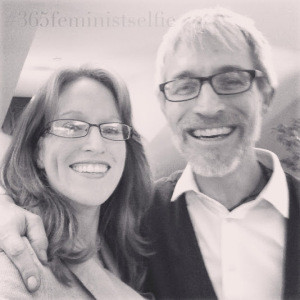
BLOG
Writing for the Web Is Crushing Your Creative Spirit
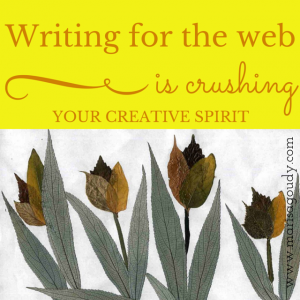 Last week, we explored how to take a story from your own life and shape it into a narrative that bolsters your visibility or furthers your business.
The goal is a simple one: connect to the reader through a description of a personal experience and then offer some useful or inspiring content that makes the reader the hero.
Last week, we explored how to take a story from your own life and shape it into a narrative that bolsters your visibility or furthers your business.
The goal is a simple one: connect to the reader through a description of a personal experience and then offer some useful or inspiring content that makes the reader the hero.
Essentially, invert that high school essay writing funnel: go from the narrow personal tale to the more universal message that speaks to the interests and concerns of your tribe.
I devoted two posts to this Art of Using Personal Stories In Professional Writing. One was a basic “how to” and the other was devoted to modeling the process.
Part of me hates that advice and part of me stands by it… because I am about to do it again.
Note: I’m defying the form I just offered you and inverting the “personal to universal” funnel. I may switch to another metaphor completely.
Since this post is about identifying and defying rules - as well as owning up to the pain of the online writing process and honoring the needs of your own creativity - funnel nixing and metaphor mixing seems acceptable.
But first, let’s establish some more rules - just so we can have the pleasure of breaking them. And so we can admit how we all feel a little broken by all these bloody rules.
Five “rules” for writing for the web
When you’re trying to follow typical internet writing conventions, you make sure that every web page or blog post is:
- Focused - Devote yourself to one central question or theme. Go deep rather than broad and realize that most of your big ideas are actually the foundation of dozens of different articles.
- Brief - This isn’t just about word count since important, “substantial” posts of 1500 - 3000 words can be highly successful. Be sure to break ideas into bite sized pieces so that the distracted reader can digest what you’re trying to say.
- Clear - Even if the goal is to raise questions for the reader rather than simply dole out a bunch of overly simplistic “shoulds,” don’t muddy the waters with your own ambivalence.
- Actionable - Every post should be the beginning of something - an ongoing relationship because the reader signed up for your list or the first step in the buying journey. You’re missing a huge opportunity if you don’t invite your reader to take a next step when they reach the end of the piece.
- Fascinating - Well, at least be interesting... The previous four rules are pretty irrelevant if you're boring the reader.
You and I will ignore those writing for the web rules (is that ok?)
Rules are made to be broken, of course, and you can point to a zillion successful articles that annihilate these conventions. Such posts compel you and even go viral because they’re aimed right at the collective sense of concern, outrage, or “awwww, so cute!”
One thing about those rule-breaking posts though? Readers may comment and share them, but they probably aren’t spending any money based on the content they've just consumed. It’s hard to invest in a writer or a company who rambles about their own confused state of affairs....
It’s important to remember - the “be focused, brief, clear, and actionable” aren’t just guidelines that exist “because the internet.” They’re just good business sense.
If “the confused mind does not buy,” then the confused entrepreneur does not attract buyers.
But what if you don’t feel focused and clear in your writing (or in your thinking)?
As I said, I kinda hate the advice I gave about using your personal stories to frame a bit of useful business information - but I believe in it enough to do it again (and again).
Telling you about my ambivalent, nuanced relationship with the blending of personal storytelling and forwarding a brand doesn’t make for focused, brief, clear, actionable prose. So, most of the time, I keep the existential angst to myself.
I tell part of my story about storytelling, hit publish and feel just good enough that I offered my readers something authentic and worthy of their time.
But then I stew. For days.
I fill a couple dozen journal pages, questioning the role of entrepreneurship and storytelling in my life. I analyze my place in the entire capitalist venture. I long to abandon business and blogging and all the well-meant advice so I can hole up with a word processor and a dream of being a novelist.
Ok, so I don’t do this every week (I’d end up in alone, likely in a van down by the river), but when I do get myself into this state, I write headlines like:
For I Will Go Mad If I Write Only for the Marketplace
I long to spool out meandering paragraphs that go on for pages, expecting the reader to stick with my muddled quest for clarity simply because she loves being along for the artist’s journey…
Invariably, I swing the other direction, glad that I’ve given up dead poets and all that opaque academic writing for the vibrant, immediate world of the creative entrepreneur.
I trust that there’s room in my life for the personal writing, the fiction writing, and the business writing.
I hate tangling my creativity in business goals and online writing rules. (Except when I don’t hate it.)
This, my friend, is not the stuff you blithely toss on the blog and share to LinkedIn with the expectation that new clients will start tying up the phone lines.
Why am I revealing all this anguish? Anguish I cooked up by publishing my own useful, business-focused blog posts? Because I think you’re going through something similar.
This writing-for-your-business stuff doesn’t always feel good. What’s the source of the pain?
Your writing process is often a burden or an unanswered "should." Let’s be honest about why all this blogging and guest posting and website content creation is hard - or even painful.
Here are 5 reasons that the creative entrepreneur resists the writing-for-your-business process (at least some of the time).
- Creativity doesn’t like serving a single-minded master - particularly when that master is concerned with doing what’s necessary to sustain a viable business
- Storytelling is an art in and of itself, and sometimes it feels like you’re selling out when you use your own stories to sell a product or service
- There’s only so much creative juice in your glass, and when you drain it for something as ephemeral as a blog post, you resent how the “real” creative projects suffer
- Certainty isn’t part of the creative journey - and you don’t want it to be… asserting your in-process vision as fact because the skimming online reader doesn’t see shades of gray feels reckless
- You want to believe that stories matter because they matter, not because they’re a means to an end
Some of these are pulled right from my own fevered journaling sessions. Others come from conversations I’ve had with creatives who struggle with their online writing chores. All of them resonate with me, but I think, collectively, we could go even deeper.
Please share your reasons for resisting or resenting the writing-for-your-business process in the comments or on your favorite social media post (please do tag me and share this post!)
Why wallow in "writing is hard!"?
We're not throwing a "woe is me, the connected creative with a business and a following and a commitment to my art" pity party here. Instead, we're owning up to our resistance and our periodic crises of faith in the whole endeavor of building an online platform.
In a world where ambivalence or being "in process" is seen as a weakness, we must take a stand for the very real state of "becoming" and embrace the clarity as well as the mess.
Dare to follow the rules of writing for the web - sometimes. Put out posts that are focused, brief, clear, actionable and tell enough of the story to meet your own Sovereign Standard.
Other days, allow yourself to defy those conventions and just write into "fascinating." Write what you must write, not what the marketplace seems to demand.
But, do me a favor - breathe deep and pause before hitting publish. Some ideas must be allowed to marinate in the mind and in the journal for a while... even if you are dedicated to making this whole online writing thing work.
Let's make this writing-for-your-business work easier... I'd love to support you as your writing coach. Have a look at what I offer and we'll set up a free 15 minutes chat about how I can help you.
The Art of Using Personal Stories In Professional Writing
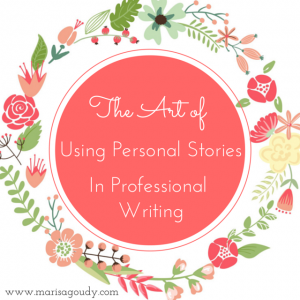 Sharing bits of your own life can be an ideal way to connect with your reader and show that you’re delightfully (or horribly!) human.
Then again, it can be a risk. Sharing too much or nattering on about something that bores your audience can kill engagement and lead to unsubscribes.
Sharing bits of your own life can be an ideal way to connect with your reader and show that you’re delightfully (or horribly!) human.
Then again, it can be a risk. Sharing too much or nattering on about something that bores your audience can kill engagement and lead to unsubscribes.
As with anything, it’s about striking the right balance. For the creative entrepreneur, that means blending a story that piques interest with useful information your readers can apply to their own lives.
Your mission: weave together story & news they can use
Two general guidelines as you balance story and practical information in your business writing:
- Provide just-juicy-enough details and personal revelations, while honoring that this is a professional space, not a confessional one.
- Remember that the reader is the hero, not you (even if you’re using your own crumby day or ecstatic moment to get an idea across). The article you’re writing or the talk you’re giving may open with lots of “I did this…” and then “I thought that…” language, but you want to bring it back to the “you” by the end of the piece.
Does every personal story need to offer the reader an obvious “what’s in it for me?”
Just as balance isn’t always about 50/50, “make your own story about the reader” isn’t true 100% of the time - at least not in an overt way.
Business writing and blogging isn’t memoir writing, but we can take a cue from the Elizabeth Gilberts and Cheryl Strayeds of the world… Even when the story is purely personal, strangers can see their own story in a first person narrative.
If you trust your readership to interpret the story and understand that they can follow your example or heed a cautionary tale, you may be able to carry the autobiographical approach all the way to end.
When you’re starting out, however, stick with this basic rule: employ a compelling story from your own life to illuminate something you’d like your readers to examine or try in their own lives.
- Be obvious about the connection between story and "lesson."
- Transition from prose to a list. (This makes it clear for the reader that they're in the "teaching bit" of the article.)
- Shift from using“I” at beginning to using “you” at the end.
Interested in seeing that in action? I walked my talk in last week’s Sovereign Standard post: As Entrepreneurs, As Writers, As Mothers: What’s “Enough”?
Did you know it was possible to take the story of a fourteen month old’s split lip and use it to describe how to best prioritize your business writing? I didn’t either…
But, as I worked through the worry and the guilt that sprang from failing to protect my girl (from gravity and a wee bit of questionable maternal judgment), I eventually arrived at secure state of “enoughness.”
And "enoughness" isn't just essential to the harried mama - it's essential for the overcommitted entrepreneur trying to honor client work and business building and the writing practice that feeds her soul as well as her marketing duties.
Learn how the Story Triangle can help you balance TMI and just enough details to draw your readers in. Sign up for the free webinar.
As Entrepreneurs, As Writers, As Mothers: What's "Enough"?
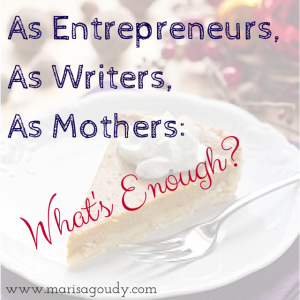 One of my girls had an accident this weekend. Though it was terrifying at the time, it ended up being relatively minor. Now I can claim a parenting merit badge my mom never earned: held my daughter as she got stitched up.
It was an accident, yes, but it could have been prevented. I could have had my hands on the kids instead of sitting inch beyond an arm’s length away. I could have said “no, honey a five year old isn’t big enough to carry her one year old sister yet.”
One of my girls had an accident this weekend. Though it was terrifying at the time, it ended up being relatively minor. Now I can claim a parenting merit badge my mom never earned: held my daughter as she got stitched up.
It was an accident, yes, but it could have been prevented. I could have had my hands on the kids instead of sitting inch beyond an arm’s length away. I could have said “no, honey a five year old isn’t big enough to carry her one year old sister yet.”
But I didn’t.
And we ended up at the emergent care center, covered in blood - and sidewalk chalk and dirt from what was supposed to be a typical Saturday spent in a yard just awakening to spring.
We’re so proud of our girl for healing so quickly and handling it all so well. And I’m pleased to report that I’ve emerged from shame’s shadows. Truthfully, the horrible guilt dissipated within twenty-four hours. (Likely that’s because much of the swelling did too).
No longer blinded by self-recrimination, I can simply hold my little one tight, overcome with gratitude and rendered speechless by how precious she is to me.
Yes, gravity won in that split second, but I forgive myself.
I’ve decide that I am mother enough for my daughter - even if I’m woefully and beautifully imperfect.
So that’s the question: how do you know what “enough” is? And how do you peacefully maintain that state of “enoughness” when you find it?
This isn’t just a question for moms with accident-prone kids - it’s a question for everyone trying to balance priorities and keep the whole enterprise from teetering into disaster.
As I understand it, the secret to contentment and enoughness - especially when it comes to motherhood and entrepreneurship and maintaining a writing practice - is in finding balance.
Balance Isn’t About 50/50. It’s About Enoughness.
 I know balance triggers people (“balance is a myth!” and “balance is BS!”), but I wish we could reclaim it. Balance is essential - but we don’t often realize that until it fails and someone ends up in the ER.
I know balance triggers people (“balance is a myth!” and “balance is BS!”), but I wish we could reclaim it. Balance is essential - but we don’t often realize that until it fails and someone ends up in the ER.
The iconic Scales of Justice have brainwashed us into perceiving balance as a 50/50 or nothing proposition, but why do we trust a blindfolded statue with something so fundamental to our happiness and success?
Balance is not about giving half our effort to work and half to play. It certainly isn’t about giving half our time to business and half family (unless that’s really the right mix for you).
As I understand it, balance is a much more rewarding, complex equation. It requires heart math I could never do in my head.
Balance is about reaching the end of each day saying "I am enough."
You may have told your partner you had too much work to do to come to bed on time. You may have blown off a writing deadline because you needed to play outside until sunset. OK. Try again tomorrow.
The essence of balance isn’t in recreating the same pie chart every day. Each portion of your life may not always get its precise allotment of resources.
Balance is about knowing what slices of pie you need to serve, and what slices you need to save. You're in balance when you can honor your commitments and ensure everyone (including you!) is getting enough.
When Everything Gets the Perfect Amount of Attention
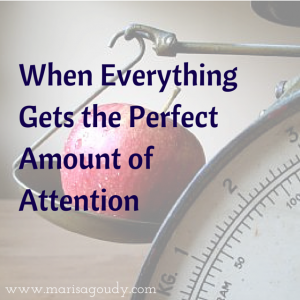 If I over-mother I start to drive myself - and my children - crazy. Most likely trying to overcompensate for something that has nothing to do with parenting, I hover and hug until we all get stressed and fatigued by a mama who is trying too hard.
If I over-mother I start to drive myself - and my children - crazy. Most likely trying to overcompensate for something that has nothing to do with parenting, I hover and hug until we all get stressed and fatigued by a mama who is trying too hard.
And if I push mothering off to the side, whatever I focus on instead - like client tasks and writing deadlines - it never gets my best work.
When everything gets the perfect amount of attention, everyone feels like they’ve been seen and supported. I go to bed full of gratitude, sure that I’ve been of service and certain that I have access to the help I need.
I won’t presume to give you advice on how to do the heart math about how much time to spend with your babies or your novel or your lover, but I know something about how to decide how much attention to offer to the different kinds of writing you do for your business.
How to Prioritize Your Business Writing Commitments
Foundational Website Content, Email Marketing, the Book Project, Blogging, and Social Media: How Much Attention Does Each Deserve?
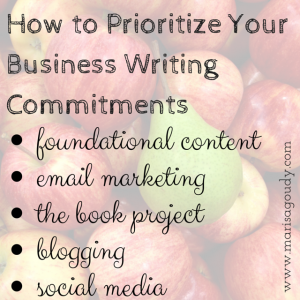 Everyone's business writing pie is going to be divided differently. You'll determine how to spend your writing time and resources depending on how well you've established your business's story, your individual goals, and the size and responsiveness of your audience.
Everyone's business writing pie is going to be divided differently. You'll determine how to spend your writing time and resources depending on how well you've established your business's story, your individual goals, and the size and responsiveness of your audience.
I've ranked the six writing tasks below by their general importance to your visibility and sales.
Remember, the goal is a sense of balance and “enoughness”! You. Don’t. Need. To. Do. It. All.
To prioritize your writing commitments, just make educated choices based on where you are now and where you want to be six months or a year from now.
- The website copy that clearly expresses who you are, what you offer, and who you serve
- The opt-in offer (eg. a special report or a “mini course” you deliver over email) that proves your expertise and acts as the first step in the clients' buying journey
- The weekly or at least bi-monthly messages to your email list
- The book project that gives you an opportunity to explore and expand your theories and stories
- The regular blog posts that boost your visibility and prove your credibility to the first-time website visitor who wants to know your work is current and your business is vibrant (stick guest posting and article writing into this category too)
- The social media posts that remind your community about the great things you do
Reorder the list based on your own personal pie. Here are a few additional ideas to help you set your writing priorities:
#1: your website copy is a non-negotiable top priority. If people spend a minute reading your site and say “Looks great…. but what do you do?” then you're wasting your time on items 2 through 6.
#2: your opt in offer is often put on the back burner, but if you want to build an email list (something you need if you expect your online efforts to make money), you need this sooner rather than later.
#3: your ongoing email marketing is the essential follow up to your opt-in offer. The people who open your emails are most likely to buy from you, so treat these individuals like the valued community members they are. (Keep in mind you can often combine this with your commitment to blogging!)
#4: a book project may not even make the list (which is totally fine!). But if it does , you can never expect to get it done if it’s less important than blogging and Facebook.
#5: blogging is great - but it’s also completely overrated if you’re focusing on weekly posts or guest posts rather than a homepage that invites people to dive deeper and crystal clear services page that gets them to pull out the credit card.
And #6... We’ve come of age as social media users and finally realize that “likes” aren’t anything more than a number. Use your social media reach as a tool to bring people back to the writing that matters - the web content that reveals your Sovereign Story.
Again: the goal is balance and enoughness. You don't need to do every item on this list and you don't need to apportion your writing resources in the same way every day.
But, as I promise to neither over-mother nor shortchange my kids on the love and attention they need, please promise me you won't lavish your attention on the writing tasks that don't matter at the expense of the projects that tell the core story of your business.
Not sure what to put first when it comes to writing for your business? Let’s set up a free 15 minute conversation to assess where you are and decide how to best invest your writing energy.
Why Writing Means So Much to the Creative Entrepreneur
 What becomes possible when you own “creative”?
Use it as a noun or an adjective. Use it as a title. Use it as a source of inspiration. Let it express your very reason for being.
What becomes possible when you own “creative”?
Use it as a noun or an adjective. Use it as a title. Use it as a source of inspiration. Let it express your very reason for being.
What happens to your work, your process, and your own view of yourself when you dare to declare yourself a source of new stories and solutions?
Not that you asked, but I can tell you that claiming “creative” changed everything for me.
If You Want to Be a Writer, Write. If You Want to Be Creative, Create.
The secret to owning “creative” is in the act of creating, of course. (If only it were that simple!)
My husband nearly threw himself into the Atlantic the morning of our wedding because he found writing his vows so frustrating. (We blame fear of writing, not cold feet!) He’s the last guy to give writing advice. But it’s the non-writer who can put it most plainly: If you want to write, write!
He suggested that when I was a bored hourly employee and when I was stifled at my salaried management job.
Later, he might have said something about “just write” when I was forcing myself through various marketing and website design biz ventures, but I couldn’t hear him over the pounding of my scared, success-starved heart.
How “Just Do It” Really Works for Creatives
“Just do it” fits nicely on a tee shirt, but it’s not advice that will change your life until you’re ready to hear it. And do it.
When my second child arrived, I saw how ragged my dreams and my reality had become thanks to a four-year-long entrepreneurial experiment. I’d learned too much to force myself into momtrepreneurship times two kids without making fundamental changes to my approach.
That’s when I realized I had to source my entrepreneurship in something other than “I have to make money for my family and be available to them at the same time” (the fundamental drive of the mom entrepreneur).
I had to devote myself to work that satisfied more than my need to be the super mom who makes the dinner and pays for it too (even though both those things still had to happen).
And so, even as my mothering responsibilities increased, I traded the identity of mom entrepreneur for “creative entrepreneur.”
Suddenly the professional title I gave myself didn’t indicate that I was an over-scheduled, under-rested woman who negotiated contracts during diaper changes. What I called myself was inspiring and invigorating rather than draining.
How Will You Connect the “Entrepreneur” and “Creative” Dots?
Yes, my daughter's birth made me realize that I wanted to leave the mom entreprepreneurs’ playground and find a place in the creatives’ studio, but realizing and doing are two different things.
Finally, I was able to listen to that wise husband of mine.
I wanted to write, I always had. I was going to write my way into the creatives’ circle. Enough with thinking they'd never admit a fraud like me who had the hopes but not the word count to prove she wanted to be Diana Gabaldon someday.
But what about you?
Writing isn’t the only way to step into the “I create things” arena, but it’s the way that is most immediately useful to the entrepreneur.
We know that creating content is essential for marketing your business and that words and stories are still the most important way to do that.
By learning how to write your book - even if it’s not the sort of trade non-fiction aimed directly at your current clients - you’re gaining skills related to story architecture, idea sculpting, and platform building that are indispensable for the entrepreneur.
Enter Sovereign Reality, Enter Tracking Wonder
Last summer when I was juggling client work and trips to the beach with the kids (it was supposed to be a vacation), I somehow stole an hour for a webinar for anyone writing & publishing a book led by Jeffrey Davis of Tracking Wonder. I'd known Jeffrey as an esteemed colleague and as a dad from the preschool and knew I loved his work, but this experience was somehow different.
I still felt like a fraud as I tuned in, there amongst the "real" creatives doing the work to become "real" authors. But over the next hour, I was filling my journal not only with Jeffrey's practical advice, but with scraps of plot and character names and ideas about the bigger themes that my novel needed to explore.
Sovereign Reality, the trilogy of novels, became real to me. And the entire concept of “sovereignty” began to take shape as the backbone of my professional work.
On that summer afternoon, I stepped on to the path. I had a work in progress. I was going to be an author. I had a new perspective on my dreams and what I had to offer to my business.
I really was a creative entrepreneur.
Making the Commitment to Creativity, Story, and the Book that Matters
By October of 2014, I found myself surrounded by a select tribe of Jeffrey’s dedicated writers at the Your Brave New Story Authors’ Intensive at Mohonk Mountain House. Immersed in my story and the importance of my compatriots’ books, I felt every bit as alive and fearless as I did in those blissful moments after childbirth - even though I was only at the very beginning of my fiction writing journey.
![]() That's the thing - writing a book is a journey and you need a tribe and you need a guide to support you. Jeffrey offers that all year long through various programs and consultancy options, but especially with the Your Captivating Book mentoring program.
That's the thing - writing a book is a journey and you need a tribe and you need a guide to support you. Jeffrey offers that all year long through various programs and consultancy options, but especially with the Your Captivating Book mentoring program.
If this really intrigues you, email me - act by April 30 and I can get you a special discount and maybe even a free initial consult with The Book Papa himself.
One final reason to think about writing that book that has been holed up inside you and to do it with Jeffrey's help: he's about more than just books and authors... He is distinguishing himself as a major voice for doing business as UNusual and speaks directly to the needs of the business artist, AKA, the creative entrepreneur.
5 Steps to Reclaiming Your Writing Practice
The Sovereign Standard, Issue 8 
A creative entrepreneur’s editorial calendar can be her salvation. Making a commitment to generate ideas, get the writing done, and put something in front of an audience signals to your community (and your brain and your spirit) that you’re fully invested in this work.
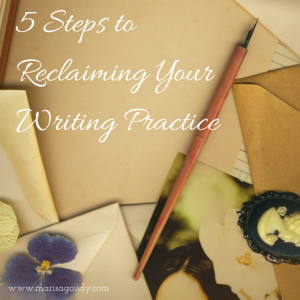 But, then again, a writing plan can just be a spreadsheet full of punishment and guilt. If you can’t seem to work the plan and meet your deadlines, does it mean you don’t truly care about your business or the people you serve?
But, then again, a writing plan can just be a spreadsheet full of punishment and guilt. If you can’t seem to work the plan and meet your deadlines, does it mean you don’t truly care about your business or the people you serve?
Of course not. But when you’re blinded by the glare of the blank page or find every idea fizzles after two paragraphs, you start to panic. Especially when you’ve been on a consistent publishing streak.
You're thinking nothing short of a natural disaster should stop you from posting on schedule, but here you are, about to fail because you can’t find and stick to one halfway decent topic on an average Tuesday.
Step 1 for Reclaiming Your Writing Practice: Set Your Information Filters
The problem isn’t a lack of ideas. Most likely, it's an overabundance of information and possibility that has you stuck.
So, the first thing to do to vanquish writer’s block is to practice discernment about what sort of information you consume.
In Relax, Their Blogging and Marketing Advice Doesn’t Apply to You I offer a case for why you can tune out what the majority of experts have to say about content marketing - even if you’re dedicated to writing a blog in support of your business.
But then, once you’ve shut off the information fire hose, you’re left with the paradox: now that I finally have some quiet around here, I’m just going to add to the noise.
Step 2 for Reclaiming Your Writing Practice: Believe In the Writing Process
Is the ultimate cure for writer’s block simply killing the urge to write?
What if you convince yourself that producing more articles just adds to the chaos of the oversaturated digital stream? Then you can just walk away from the whole writing enterprise and congratulate yourself for reducing the information glut, right?
No. That’s not right.
There is no greater agony than bearing an untold story inside of you.
- Maya Angelou
Writing is medicine. Words want to make alchemists of us all.
To shape your flashes of insight and prayers of gratitude and revelations of joy into a message that someone else can understand… that is the great prize of the human intellect, the greatest expression of aliveness in this Age of Information.
Writing has saved your sanity more times than you can count, but you forget this. I forget this. And so we research a little more in order to avoid taking the cure that is just as bitter as the disease.
Why is it that when it's time to write we open Google Search instead of opening a Google Doc?
Step 3 for Reclaiming Your Writing Practice: Avoid Writing By Reading About Writing
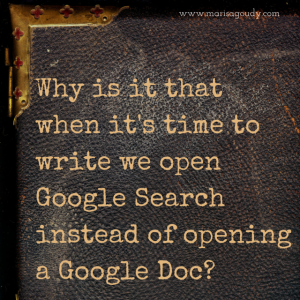 Proving that we need writing to sustain us, when I didn't want to write this week, I began to read.
Proving that we need writing to sustain us, when I didn't want to write this week, I began to read.
Writer's block isn't hard to cure. Just write poorly. Continue to write poorly, in public, until you can write better.
He’s right, of course, but the path to success he describes is outlined in traffic cones. Like me, I am betting you were hoping for velvet ropes or a seashell strewn path.
So turn to Kelly Galea who offers the same idea but prepares you a soft writer’s nest with the perfect writing implement and a beloved journal.
Just express yourself. Just BE. So simple, really. Again, are you wondering where these thoughts and words are coming from? This pen. How is that for an answer? The pen is an instrument … YOU are an instrument. Be used to express this collective consciousness in YOUR voice – your unique voice, the voice someone (MANY someones) are waiting to hear, to call them forth, to bring them home. Lead them, guide them, help them, inspire them, teach them. Give them hope. Give them love. Give them that spark. Give them compassion for themselves.
Kelly got me cozy, but I might just burrow into that nest she crafted with her words and never write a thing, so I look to Jeffrey Davis to get me moving.
In Jeffrey’s Post Ecstasy Laundry List he addresses the inevitable come down after a peak creative experience, but much of this advice applies to you if you can’t imagine feeling creative ever again.
He’s telling you to keep writing too:
Make mistakes. The only catastrophic choice a writer makes is not to choose. Whether it’s genre or working story arc or angle. Show up. Get messy. Hit dead ends. Flounder. That’s part of the quest.
Step 4 for Reclaiming Your Writing Practice: Assimilate Rather than Create
I allowed myself one more click before I told myself I would just walk away from the desk and pray for inspiration over the next diaper change (after all, it’s in moments of rest and boredom that the real answers flow).
Then I discovered Karen Brody’s work. Great goodness! She’s an expert in the struggle exhausted, depleted women who inspires you to change your way of being: “Because your life needs you fully charged.”
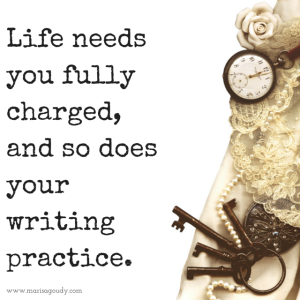 Life needs you fully charged, and so does your writing practice. Addressing writer’s block by staring at the page is like passing someone a Kleenex to cure grief.
Life needs you fully charged, and so does your writing practice. Addressing writer’s block by staring at the page is like passing someone a Kleenex to cure grief.
Karen offers 9 insights into the art of being well-rested, and it's barely a stretch to apply each of these to the “I have no idea what to write” lament. My favorite:
Welcome Everything. Think of all the hours you live in an either/or mentality. Real transformation comes when you can drop the false idea that you’re separate.
Apply this approach to your daily life, welcoming every experience as a potential inspiration for your next blog post or article.
Step 5 for Reclaiming Your Writing Practice: Practice Compassion
Bless you and your commitment. All hail your editorial calendar that can. You keep rocking that publishing streak.
But remember that your writing practice is meant to give back to you.
The hours you put in aren’t just in service to another post, another snack for the voracious internet marketing beast.
Your next post is a distillation of your presence in your life and in your business. It is a message from the heart of your work to the heart of someone who needs your wisdom, encouragement, or strategic advice.
The people who matter - the people who want to be beguiled and convinced and changed by your words - they don’t want you to look at a blank page gone blurry with tears of frustration. If they must, they can wait til next week.
And so can your spreadsheet.
But before you give up and beat yourself up:
- tune out the extraneous noise
- remember why writing matters to you
- seek wise counsel
- be present in the moment, and
- be kind to yourself
I can’t wait to read what you'll write next!
This post was sent to Sovereign Standard subscribers first. To join our community of readers and contributors, please subscribe here.

